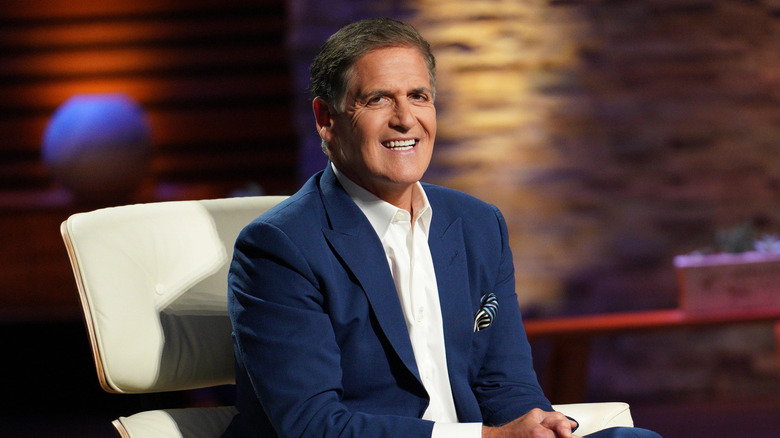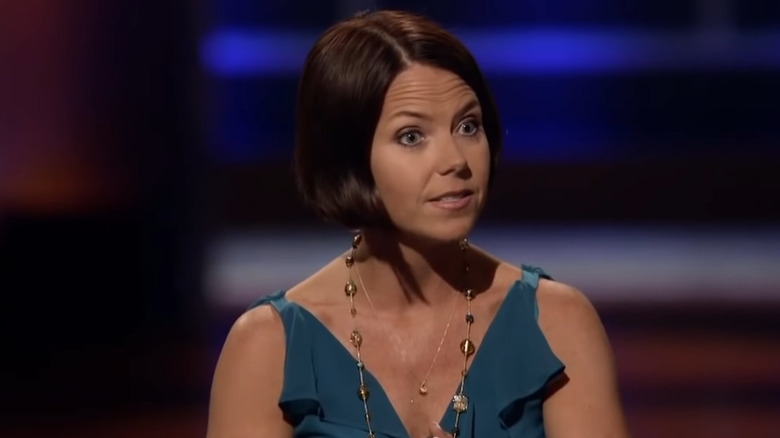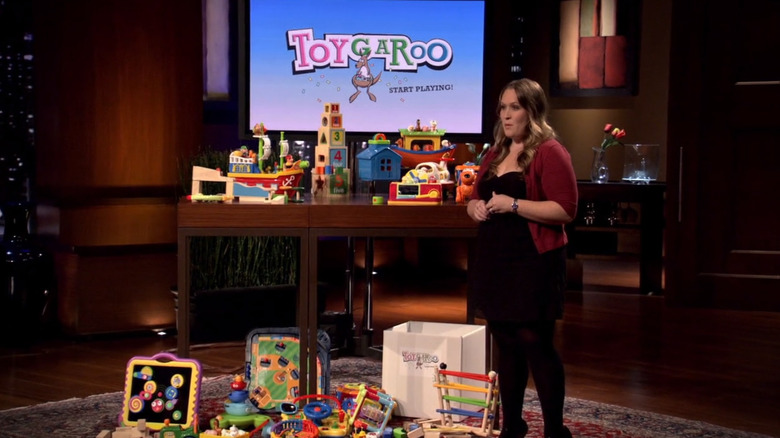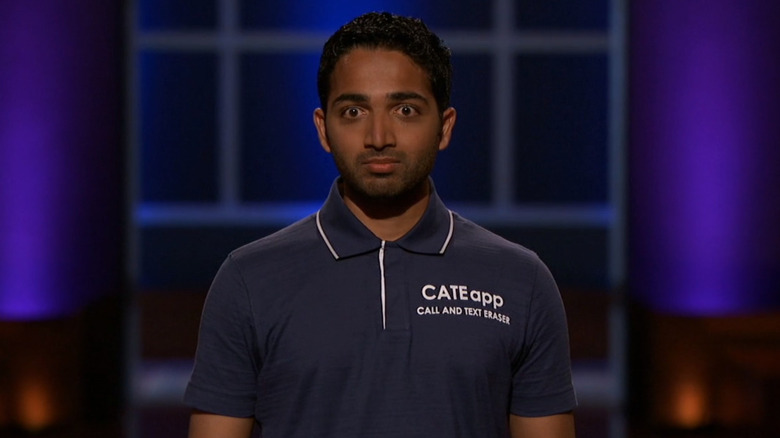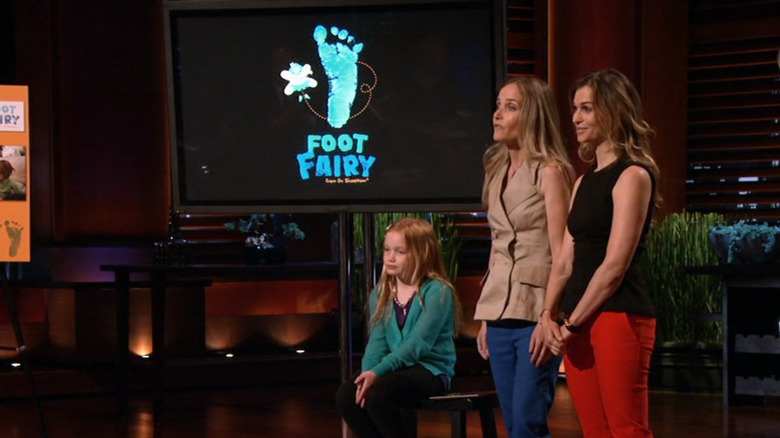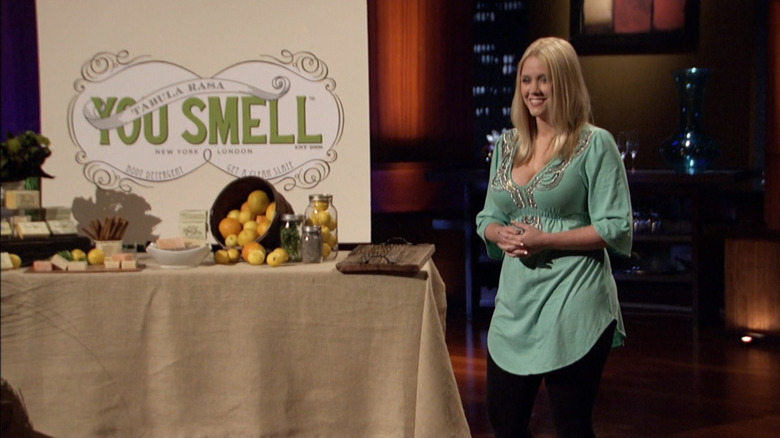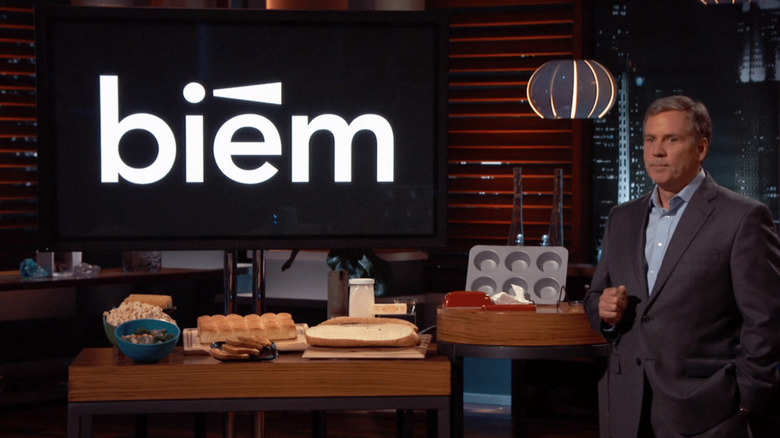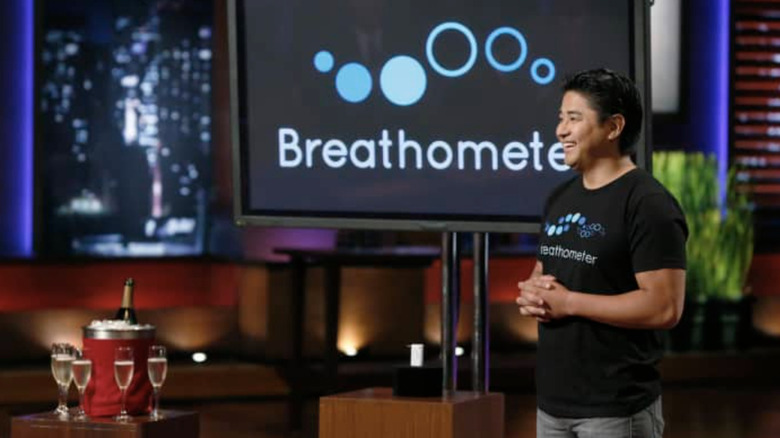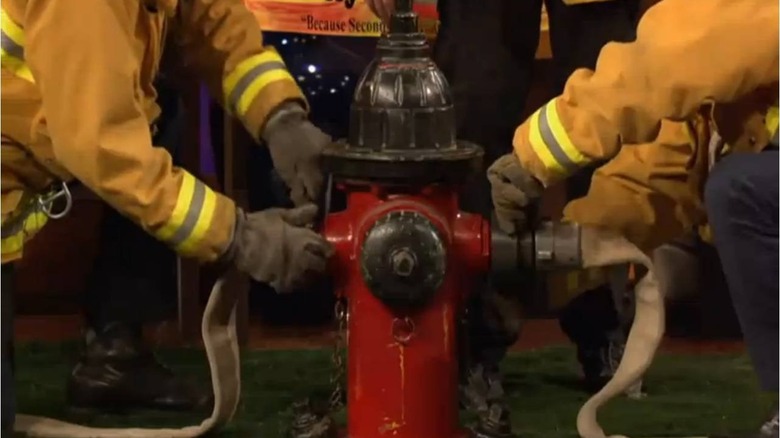9 Famous Shark Tank Companies That Don't Even Exist Anymore
Premiering in 2009, "Shark Tank" is a reality TV series that focuses exclusively on entrepreneurship. The series has been going strong for 14 seasons as audiences can't seem to get enough of the creative business ideas brought forward to the intense and highly successful judges. Every episode follows various groups of entrepreneurs who pitch a presentation of their business ideas to a panel of five potential investors known as the Sharks. Their goal is to walk away with an investment deal in exchange for funding. However, there's a slight catch, as the Sharks can be known to play a little rough. Typically, the Shark that chooses to invest in a company pitch will ask for equity in the business — one that can range from 20 to even 50%.
Now, here's where things get fun. Sometimes, the Sharks will be so impressed with a pitch that they all begin to fight each other over an investment, resulting in the entrepreneur having their pick of investor. The stakes may be high, but the drama is even bigger, which is what makes the show such a hit. And while there have been massive success stories for businesses that are featured on "Shark Tank," there have also been a few hiccups along the way. Let's take a look at 10 famous companies featured on "Shark Tank" that got a deal with the Sharks before ultimately fizzling out.
ShowNo Towels
Shelly Ehler brought her business (and her kids) ShowNo Towels to the Sharks in Season 3 and was looking for a $50,000 investment and a 25% share in her business. Luckily for her, things went better than expected as Lori Greiner invested $75,000 for the same share percentage. And Ehler's luck only seemed to continue as later that season it was revealed that Greiner struck a deal between ShowNo Towels and Disney, which saw the product sold at Disney water parks. It was almost like a dream come true, except that things quickly fell through.
Disney did not reorder Ehler's product which caused a major dry spell in production for ShowNo Towels. And without the House of Mouse to back her up, the company closed up shop for a while. However, Ehler refused to give in to defeat, as she gave her business one more try by selling on her Facebook page. Alas, all good things must come to an end as she announced in August 2020 that she was "throwing in the towel" once more and was pivoting towards a new career path.
In November 2021, Ehler did pop back onto the ShowNo Towels page to release a few limited-edition towels. And while that post didn't have too much action, there was one comment that reminisced about the good ol' days of her time on "Shark Tank," stating that they recognized her business from the episode and that her story was touching for their family.
ToyGaroo
Nikki Pope pitched to the Sharks in Season 2 and her company, ToyGaroo, was a smart concept. Pope described it as being like a subscription service for children's toys. Most parents know the struggle of constantly buying their kids toys only for them to get bored quickly. So what are you supposed to do with all those toys and all that wasted money? Well, parents could use ToyGaroo to rent toys online and then return them when their child no longer wanted to play with them.
Pope went in asking for $100,000 in exchange for an equity stake of 10%, and while she did walk away with more than double her asking price, there was some negotiation to get there. Kevin O'Leary matched her price ask, but bumped the equity stake up to 35%, while Cuban and Robert Herjavec did a joint investment together for $200,000 at a 40% stake. However, O'Leary managed to convince Cuban to cut Herjavec out of the deal by replacing it with him, as he had more experience dealing with toy retailers. Cuban accepted, and Pope took the deal.
Unfortunately, things took a turn according to ToyGaroo's software designer and web developer, Phil Smy. In an interview with Failory, Smy claimed that the team had a difficult time working with representatives of the Sharks, and that cost of sourcing and shipping began to "spiral" out of control. Ultimately, when there wasn't enough money to go around, the team decided to shut the company down.
CATE app
Neal Desai pitched an app called CATE in Season 4 of "Shark Tank." Initially, Desai had purchased the app from a police officer that was too busy to pursue working on it. At the time, he paid $17,500 for it but was asking the Sharks for $50,000 with a 5% equity stake. CATE was a privacy app that was designed to hide calls and messages from select contacts. Desai pitched it as being the ultimate tool to help those attempting to get away with having affairs. It gives the user a discrete option and would therefore help to avoid any potential fights from their partners, as they'll be none the wiser about the affair.
Eventually, Desai received an investment of $70,000 for a 35% equity from O'Leary and Daymond John — much to the dismay of Corcoran who was visibly disappointed in what the app represents. However, Gazette Review reported that the deal fell through. Despite this, the exposure was helpful for the app as more than 10,000 people downloaded it. Plus, Desai was able to persuade law enforcement and government markets to give the app a go.
Unfortunately, this didn't last long, and the company has been offline since 2013. An interesting thing to note is that Desai stated that the app would be testing an iOS version to release, but right before it shut down, the app was only available for Android. Perhaps funding was a big cause for such a disappointing end for Desai's business.
Foot Fairy
Sylvie Shapiro and Nicole Brooks brought their iPad app, Foot Fairy, to the show in Season 5. As a podiatrist, Shapiro noted that parents simply guess their child's foot size, and this leads to major problems for the children as they grow older. Plus, she found that shopping for kids' shoes can be a headache. It's because of this that she invented an easy-to-use app that allows parents to track the shoe size of their child in one easy step at home. To demonstrate this, she brought her daughter out to present to the Sharks by simply placing her foot on the iPad to determine her foot size.
Cuban offered Shapiro and Brooks an investment of $100,000 for 40% equity, and while it looked like a done deal, it unfortunately never went through after filming (per Gazette Review). It's likely that Shapiro and Brooks really needed this investment to work, as only a few months after the episode aired, Foot Fairy closed down for good.
This is likely due to the fact that there are now various other shoe-sizing apps to use, making the concept seem less unique. Plus, it certainly wasn't breaking any "Shark Tank" records. And what's more, while Shapiro had an interesting connection to the product as a podiatrist, neither she nor Brooks were app developers, so they had to pay an outside source to do the technical work. This is likely why the company never even had a website when pitching to the Sharks.
You Smell Soap
Season 3 introduced audiences to Megan Cummins, the entrepreneur behind the company, You Smell Soap, a luxury soap brand that had two different scents. While pitching, Cummins announced that her company was in a "pre-venture stage," meaning she hadn't made any sales just yet. However, she did send samples out to stores, with a few coming back to her with interest (one of them being Urban Outfitters).
A few of the Sharks offered Cummins a partnership, but it was Herjavec who sealed the deal, as he offered Cummins an investment of $55,000 with 20% equity — plus a 50K guaranteed salary in the first year. She graciously accepted his offer, but it was right after that when things got a little strange for Cummins. Per Shark Tank Success, Cummins was unable to reach Herjavec and his team for six months.
This is because Herjavec seemed to have forgotten that You Smell Soap was a startup, and thus had no sales. Once he made that discovery, his team got back to Cummins with a revised offer of 50% of her business. It should come as no surprise that Cummings opted to reject this new deal. Instead, she attempted to do things her own way, which she had moderate success with — especially after her "Shark Tank" episode aired. However, in 2014, Cummins sold the brand as the profits were no longer lucrative.
Body Jac
Season 1 brought Cactus Jack Barringer to the Sharks with his company, Body Jac, a fitness machine designed to make push-ups easier for people who struggled to do them. Barringer claimed to be a lifelong entrepreneur, having never worked a job in his life. He went in asking for $180,000 and 30% equity for Body Jac, and while he got his dollar amount investment, it was at an equity percentage of 50. This was also made with the caveat that he would have to use the Body Jac to lose a significant amount of weight within an allocated timeline in order to prove to Corcoran that his product actually worked.
However, things between Barringer and the Sharks eventually turned sour, especially with Corcoran who publicly stated in 2012 (via BizzBucket) that making this deal was a big mistake on her part. Body Jac officially cut ties with the Sharks in 2013, with Barringer determined to push on with his product. And he was able to do so for a few years, with his company lasting until 2015 at the latest.
Unfortunately for him, Body Jac didn't have enough longevity, with the company officially closing its doors sometime after that year. It's a shame because Body Jac was initially valued at around $360,000 when Barringer went to pitch the Sharks. It's clear that Body Jac was something special — at least for a little while.
Biem
Season 8 of "Shark Tank" introduced Doug Foreman's kitchen utensil for spraying butter, Biem. He was offered an investment of $500,000 from Greiner with an equity of 14%. Unfortunately, Greiner was forced to back out of the deal early, as the Better Business Bureau got involved with Biem. It was revealed that Foreman did not have a working prototype when he went on "Shark Tank," something that he alluded to having — and if there's one thing you don't want to do, it's to mislead a Shark.
By the time Foreman made it to the due diligence stage of their deal, he still didn't have a prototype. And if that wasn't enough to make Greiner back out of their deal, the Better Business Bureau investigated Biem's parent company, Brevda, Inc. after calls about business management were brought to their attention. 33 different customers reported that their products' shipping was delayed by several months and once they finally received their package, the products didn't work.
Once the Bureau completed its investigation, the parent company was forced to issue a statement that they would make a better product to combat the faulty one. However, that didn't last long, as the company went under in 2019. And as for Biem, the website is still up and promoting its time on "Shark Tank," however the butter spray products are indefinitely sold out, as the business has likely gone under with its parent company.
Breathometer
Charles Michael Yim pitched his Breathometer in Season 5 of "Shark Tank." The Breathometer was a portable device that connected to an app on your smartphone and was used to measure the blood alcohol levels in a person. Yim had such a successful pitch that he was able to get all of the Sharks interested in investing, resulting in him getting an investment of $1 million and 30% equity from all five Sharks. This valued Yim's company at $3.3 million after his time on the show.
Cuban would later call the Breathometer the worst "Shark Tank" investment he ever made, claiming that Yim would often take lavish trips rather than work. However, Yim claims that Cuban's statements are completely off base, arguing that he never used company money on personal travel. Things continued to go badly for Yim as the Federal Trade Commission (FTC) filed a complaint against the Breathometer, claiming that it "lacked [any] scientific evidence to back up their advertising claims." In 2017 of that same month, the company reached a settlement with the FTC, forcing them to provide a refund for every customer that bought a Breathometer device
HyConn
Jeff Stroope pitched his easy-to-use fire hose connector to the Sharks in Season 2. He was offered an investment of $1.25 million, but there was a major catch: Cuban wanted 100% equity. However, Cuban was willing to give Stroope 7.5% royalty fees and three years of employment in exchange, which Stroope accepted. Unfortunately, he would come to regret his decision in time.
In a statement posted to Facebook, Stroope claimed the deal began to change the moment the cameras were off, stating that Cuban "almost immediately" decided that he no longer wanted to go through with their agreement. For Stroope, he believes that Cuban's "ego" ultimately got the better of him, arguing that the Shark no longer wanted to front the money. And while Stroope claims to hold no ill-will towards Cuban and "Shark Tank," he shared his disappointment that by the time his episode aired, he would not be able to enjoy the exposure that would come along with it, as his company could no longer sustain to carry on.
Audiences still have the option to look at videos of HyConn online, but the product is ultimately not available to purchase. It seems as though Stroope really needed that funding to transform his pitch into a reality — just as Herjavec says, you "never disrespect money." It can make or break a business. And no one knows that better than the "Shark Tank" companies on this list.
